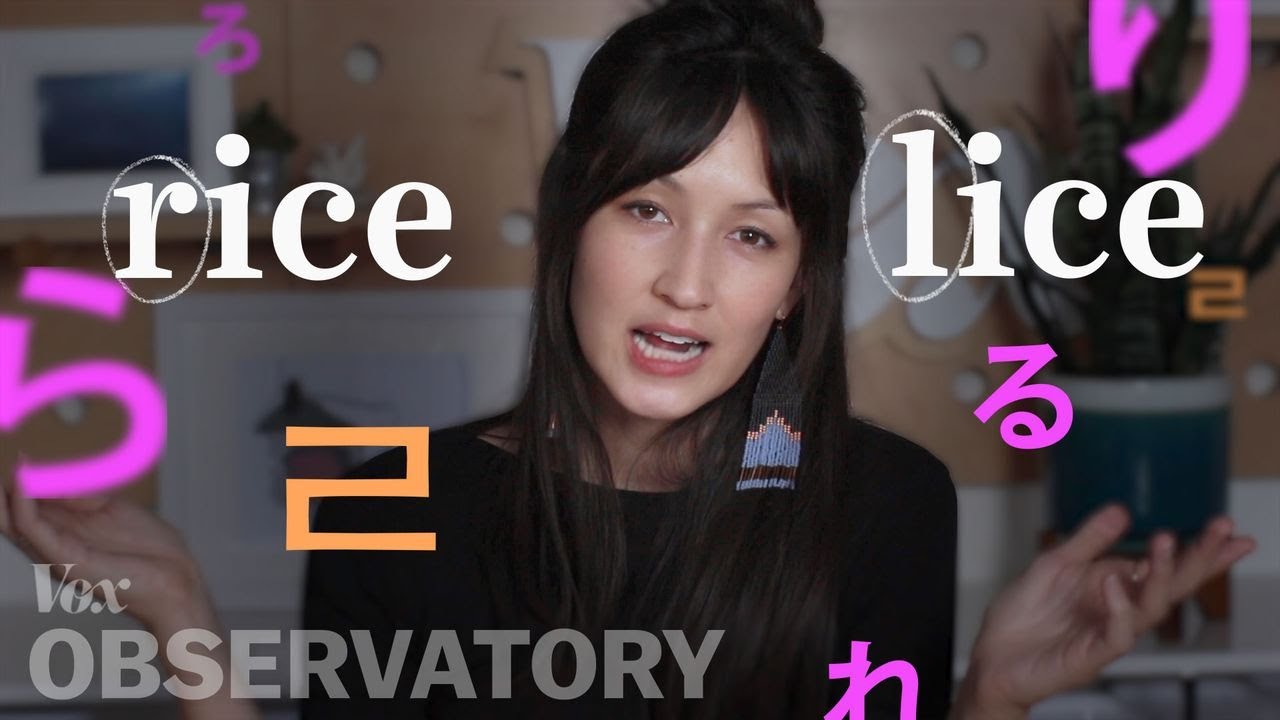Vox
A linguistic stereotype, explained.
This video is presented by Brilliant: https://brilliant.org/Vox/
Thank you the Video Lab members (Janet, Martian, and Mariko) who helped me with this video. To learn more about the Video Lab and sign up, visit http://bit.ly/video-lab
Check out Yuta’s Youtube channel here: https://www.youtube.com/user/YPlusShow
And browse Dr. Lawson’s ultrasound examples here: https://www.seeingspeech.ac.uk/r-and-l-in-english/
A foreign accent is when someone speaks a second language with the rules of their first language, and one of the most persistent and well-studied foreign-accent features is a lack of L/R contrast among native Japanese speakers learning English.
It’s so well-known that American soldiers in World War II reportedly used codewords like “lallapalooza” to distinguish Japanese spies from Chinese allies. But American movies and TV shows have applied this linguistic stereotype to Korean and Chinese characters too, like Kim Jong Il in Team America: World Police, or Chinese restaurant employees singing “fa ra ra ra ra” in A Christmas Story.
However, Japanese, Korean, and Chinese are completely different languages that each handle L-sound and R-sounds differently. In this episode of Vox Observatory, we take a look at each language and how it affects pronunciation for English-language learners.
Vox.com is a news website that helps you cut through the noise and understand what’s really driving the events in the headlines. Check out http://www.vox.com.
Watch our full video catalog: http://goo.gl/IZONyE
Follow Vox on Facebook: http://goo.gl/U2g06o
Or Twitter: http://goo.gl/XFrZ5H .(tagsToTranslate)asia(t)asian(t)accent(t)Vox.com(t)vox(t)explain(t)explainer(t)linguistics(t)asian languages(t)east asia(t)korean(t)japanese(t)chinese(t)L and R sound asian languages(t)asian languages L and R sound(t)asian languages R and L sound(t)R and L sound mixups(t)asian accents(t)east asian accents(t)asian stereotypes(t)asian accent stereotype(t)foreign language acquisition(t)ESL(t)joss fong(t)vox observatory(t)racist asian joke(t)japanese accent(t)chinese accent(t)korean accent(t)japanese pronunciation




The guy's name is Martian.
Really interesting topic but on top of that, the girl presenting it is just mesmerising ♥
Never be ashamed of your accent
what they’re saying is it’s okay to make fun of Americans for mispronouncing things, but it’s not okay to do the same for other cultures
Do you want some Lice and sweet soul sauce?
P for F, B for V and O for U. What accent am I?
5:49 hmmm this song is familiar ?????
narrator is so beautiful 🙂
In Cantonese the words 'buy' and 'sell' sound exactly the same, super confusing.
united Terrorist states-War Criminal owned by the world elite(human rights violating, white terrorist colonizer)
vox,all major media are scripted propaganda tools of the world elite
9/11 staged psyop by world elite
9/11 staged by the united Terrorist states(War Criminal) & world elite
I am spanish, I used to have an american girlfriend. I tried to teach her how to roll the R's like we do… I couldn't, so difficult to explain. She couldn't distinguish between "perro" and "pero".
East Asian languages also tend to use far less numbers of vowels than English does.
If a Japanese person is going to a store to buy some 'soap' it'll sound kind of like 'soup', and kind of not.
My journey learning Portuguese suddenly seems like a walk in the park now! Lol! Great video, well explained!
Oh Joss, marry me ?
"President Election"
That’s about what I figured, but I was on a way more basic level.
My first language is Russian, I have been speaking English for a decade, but still can not grasp what is wrong the "tried very hard" part at 7:17. Sounds like legit English with slight accent to me, no sounds missing or mispronounced!
It's them! The La-Li-Lu-Le-Lo!
Just wanted to say that this is super linguistically sound! Very well researched and the concepts were explained clearly for non-linguist audiences without losing their meaning.
My husband and I are both Chinese. He came from a part of China that speaks a dialect quite different from Mandarin. He has real difficulty pronouncing h sound and f sound in Mandarin, every time I tried to correct him, he said it sounds the same to him. This video really help me learn that he wasn't joking when he said that.
She is sooo beautiful! ><
When a non native english speaker is able to speak some english not perfectly, they can laugh at. When a native english speaker can't speak another local language in a native country, that's perfectly fine. Meanings, being an ignorant is fine. This is a funny world.
Am i the only one think the speaker looks exactly like twin sister of Bella Hadid?
You forget that americans like to stress the letter "R" in most words with R close to or at the end of a word.
Also can you do an episode on the lisp. I personally find that I pronounce the letter S with my entire tongue and not the tip.
I hate you for putting wifi unbreakable in the beginning. I can't take you seriously now.
I think you can actually delve deeper into another language like my mother tonge vietnamese when it comes to tone, because there are huge differences in terms of localities and geography. Take the example of this consonant "nh" in vietnamese, which is not available in english. "nh" is like "nj" in english but the placement of the tongue is completely different. We also have something like dấu ngã, dấu hỏi, dấu nặng,dấu sắc, dầu huyền, thanh không dấu, which can even confuse primary schoolers :)))) I also belive the way thais people speak their native tongue can influence their english speaking ability, so it's pretty interesting for this topic. Anw, this is a very informative video about cultural differences in language speaking, which may hinder our understanding at some situations :))))
Engrish
Vox trying to find offence where there is none.
Beautiful narrator 靓主播.
She is a beauty…
I am still waiting for a new Joxx video!